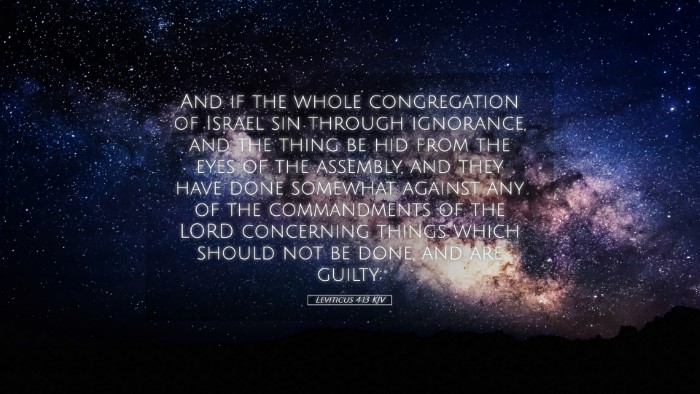Commentary on Leviticus 4:13
Leviticus 4:13 (KJV): "And if the whole congregation of Israel sin through ignorance, and the thing be hid from the eyes of the assembly, and they have done somewhat against any of the commandments of the Lord concerning things which should not be done, and are guilty."
Introduction
Leviticus 4 presents the laws concerning sin offerings, emphasizing the seriousness of unintentional sin within the community. In verse 13, it highlights a collective sin that can occur even among the people of Israel, when the entire congregation may inadvertently transgress the commandments of God.
Context and Background
The Book of Leviticus is primarily concerned with the holiness of God and the worship practices of the Israelites. Written to instruct the people of God, it lays out various regulations for offerings, atonement, and communal life. Specifically, chapter 4 addresses how to deal with sin, establishing a framework for acknowledging guilt and restoring right standing with God.
Exegesis of the Verse
The verse begins with the collective nature of sin, referring to the "whole congregation of Israel". Matthew Henry comments that this illustrates the corporate responsibility of God's people. When a community errs, it reflects the spiritual state of the entire body, pointing to the unity and interdependence within the community of faith.
The Nature of Ignorance
Ignorance is central to this verse. Albert Barnes elucidates that this ignorance does not excuse the guilt but highlights the need for atonement even when the sin is unintentional. The term "ignorance" suggests that not all sin is deliberate; however, it demonstrates that God’s commandments are still to be adhered to, reinforcing the call for vigilance in spiritual matters.
The Hidden Sin
The text mentions that the sin is "hid from the eyes of the assembly". Adam Clarke stresses the idea that sin can infiltrate the congregation subtly and unnoticed. This underscores the challenge of communal discernment and the temptation to overlook collective shortcomings.
Guilt and Accountability
The latter part of the verse states, "and they are guilty." This declaration marks the importance of acknowledgment in recognizing one’s sins as a community. This aligns with Henry's view that confession is essential for receiving God’s mercy and restoration. Pastors and theologians must recognize that corporate guilt requires a collective response, which can involve communal repentance, prayer, and seeking God's forgiveness.
Theological Implications
This verse provides rich theological insights about sin, atonement, and the nature of community. It raises crucial questions about accountability and the role of the congregation in maintaining holiness.
The Weight of Community Sin
-
Corporate Responsibility: This passage teaches that the health of a community is influenced by each member's actions. The community bears the responsibility to support each other in maintaining holiness.
-
Atonement is Collective: The prescribed sin offering signifies the seriousness with which God views sin, even when unintentional. This reflects God's desire for his people to remain in right relationship with Him and with each other.
-
Call for Awareness: Leaders within the church must cultivate an atmosphere of awareness about sin's presence in the community, urging members to actively engage in seeking God's face and examining their collective conduct.
Application for Believers
In light of this passage, believers are challenged to consider the implications of their actions not just individually, but as a part of the church body. Ignorance of sin does not absolve responsibility. Each member's spiritual state affects the whole congregation, calling for unity in holiness and accountability.
Practical Steps:
- Promote Open Dialogue: Encourage discussions about sin, confession, and accountability within the church community.
- Regularly Review Practices: Engage in communal evaluations of practices and beliefs that may lead to collective sin.
- EmbraceRepentance: Foster an atmosphere that encourages communal and individual repentance, seeking God's guidance.
Conclusion
Leviticus 4:13 serves as a vital reminder of the nuances of community sin and God's call for the assembly to remain vigilant. As believers reflect on this scripture, they are beckoned to acknowledge their role within the body of Christ, promoting a culture of holiness and accountability. Understanding the implications of unintentional sin strengthens the community's bond and draws them closer to God's intended purpose for His people.


